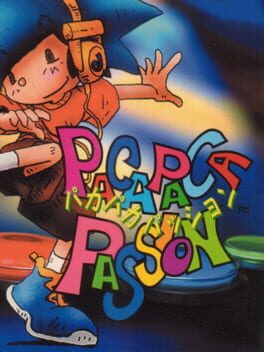

Reviews View More
Played during the Backloggd’s Game of the Week (1st Aug. – 7th Aug., 2023).
The success of beatmania (1997) gave rise to a series of similar rhythm games, each with its own special features, whether it was the inclusion of specific instruments or unexpected innovations such as Dance Dance Revolution (1998) – the concept of which had already been seen on the Famicom in Family Trainer: Aerobics Studio (1987). As part of this huge boom in music games at the end of the 1990s, Produce sought to make its own mark, after having worked as a contractor for Enix and Hudson on numerous RPGs and Bomberman respectively. The result was Paca-paca Passion, a mash-up of beatmania and PaRappa the Rapper (1996).
However, the borrowed elements lack coherence and produce an experience that is structurally inferior to both games. Paca-paca Passion displays notes on a fixed bar, with the beat advancing with the music, rather than the now traditional formula of notes advancing while the beat bar remains fixed. The title is also limited to two or four buttons, played by single presses only. In this respect, the game is similar to PaRappa the Rapper: yet such an approach detracts from visibility. In PaRappa the Rapper, the player is invited to reproduce a musical phrase and can prepare in advance by following the example of the co-singer. In Paca-paca Passion reacting quickly is very difficult, especially as the timing required is particularly demanding – the Perfect falls on the attack of the beat and any delay is severely punished; even though the tracks are fairly easy to follow thanks to the relatively simple composition, the player has no choice but to learn all the tracks by heart to keep up with the AI and survive its onslaught at higher difficulties.
As Paca-paca Passion is ill-suited to sight-reading, the title suffers from a rather unfair difficulty and is quite tough to learn [1]. The various tracks have a playful tone reminiscent of yacht rock, but struggle to create a truly transcendent experience. The asymmetric gameplay with the choice of instrument is an interesting gimmick, but ultimately under-exploited, since the different songs do not rely on call and response. Despite two subsequent attempts, Produce never managed to establish Paca-paca Passion in the same way that Bemani did with its galaxy of music games. The company folded in 1999, leaving the concept to fade away outside of fan games. At most, some arcade machines still exist, and the music tracks survive through their inclusion in other rhythm games, such as CHUNITHM (2014).
__________
[1] The fan game pal-melo, based on the concept of Paca-paca Passion, has its own unforgiving tracks; how difficult they are is up to the reader.
The success of beatmania (1997) gave rise to a series of similar rhythm games, each with its own special features, whether it was the inclusion of specific instruments or unexpected innovations such as Dance Dance Revolution (1998) – the concept of which had already been seen on the Famicom in Family Trainer: Aerobics Studio (1987). As part of this huge boom in music games at the end of the 1990s, Produce sought to make its own mark, after having worked as a contractor for Enix and Hudson on numerous RPGs and Bomberman respectively. The result was Paca-paca Passion, a mash-up of beatmania and PaRappa the Rapper (1996).
However, the borrowed elements lack coherence and produce an experience that is structurally inferior to both games. Paca-paca Passion displays notes on a fixed bar, with the beat advancing with the music, rather than the now traditional formula of notes advancing while the beat bar remains fixed. The title is also limited to two or four buttons, played by single presses only. In this respect, the game is similar to PaRappa the Rapper: yet such an approach detracts from visibility. In PaRappa the Rapper, the player is invited to reproduce a musical phrase and can prepare in advance by following the example of the co-singer. In Paca-paca Passion reacting quickly is very difficult, especially as the timing required is particularly demanding – the Perfect falls on the attack of the beat and any delay is severely punished; even though the tracks are fairly easy to follow thanks to the relatively simple composition, the player has no choice but to learn all the tracks by heart to keep up with the AI and survive its onslaught at higher difficulties.
As Paca-paca Passion is ill-suited to sight-reading, the title suffers from a rather unfair difficulty and is quite tough to learn [1]. The various tracks have a playful tone reminiscent of yacht rock, but struggle to create a truly transcendent experience. The asymmetric gameplay with the choice of instrument is an interesting gimmick, but ultimately under-exploited, since the different songs do not rely on call and response. Despite two subsequent attempts, Produce never managed to establish Paca-paca Passion in the same way that Bemani did with its galaxy of music games. The company folded in 1999, leaving the concept to fade away outside of fan games. At most, some arcade machines still exist, and the music tracks survive through their inclusion in other rhythm games, such as CHUNITHM (2014).
__________
[1] The fan game pal-melo, based on the concept of Paca-paca Passion, has its own unforgiving tracks; how difficult they are is up to the reader.
